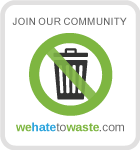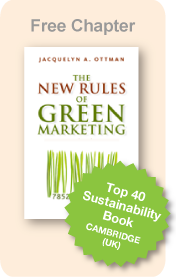Jacquie Ottman's
Green Marketing Blog
EcoPower to the People
June 03, 2009 by Jacquelyn Ottman
Whom do you trust to make green marketing claims? The answers surprised us. Yesterday at the Sustainable Brands ’09 Conference in Monterey, California, we polled all 350 participants about the notion of trust when it comes to verifying green claims and create standards for products.
We specifically asked these on the cutting edge of green and sustainability leaders and activists who they themselves trusted to this important task, who consumers trusted, and who they thought was best equipped to verify claims and create standards for green products and marketing.
The Results
We specifically asked them to rate five groups on a scale of 1 (most) to 6 (least): Environmental groups, NGOs and other third parties, Retailers, Federal Government, Manufacturers, and Others. This write in vote yielded some intriguing responses.
The results were so consistent, it’s not necessary to get into the actual numbers (though I’ll give them to you if you want.) In a nutshell, the results stratified into three categories: NGOs and environmental groups came out squarely on top, with NGOs a bit in the lead; the federal government settled somewhere in the middle (a little surprising to me, quite frankly), and retailers and manufacturers ended up on the bottom of the pile.
I wasn’t too surprised by manufacturers’ poor showing; after all if industry ranked high, there would be no reason for ecolabels in the first place. I was a bit surprised by retailers poor showing, though it may make sense given what may be construed as a conflict of interest—what retailer wouldn’t want to label every product on its shelves with a green label to make it sell faster? Such a poor merchant showing suggests that the many retailer eco programs may be misplaced —examples include the Home Depot’s Eco-Options, Staples’ EcoEasy, and the Office Depot Green Depot.
These poll results were presented at a featured breakout session at the conference. So it was fun to compare these results with poll data presented by the panelists which included Underwriters Laboratories, the product safety giants who announced their new claims certification and standards setting service, GreenGuard, the indoor air quality certifiers, and representatives from the U.S. EPA, the creators of the Energy Star label for energy efficiency, the Design for Environment label for green chemistry (used in many cleaning products), the Smart Way label for transportation like FedEx, and Water Sense, for water-using products.
If our informal participant poll is correct, the future of ecolabeling and claims certification belongs to players like UL and GreenGuard—Independent, third party certifiers with a stake in ensuring the transparency and credibility represent the future of ecolabeling. UL, in particular, may represent the most sustainable of the players given their longevity (115-years strong), reach around the world, especially in China and other countries where most products are manufactured (7000 employees), and formidable technical expertise. (Full disclosure: UL is a client of ours.)
The Federal Government is not going to go away as an ecolabeler. Despite surprisingly middling credibility on our little poll— I personally would welcome readers input as to why this is so—The Federal Government is filling in a much needed gap not being filled by NGOs or the private sector to label critical industries such as organic food, energy and water-using products, and transportation. Diane Feinstein, the Senator from California, is readying a bill which would empower the Federal Government to create a multi-attribute eco-label much in the spirit of the ecolabels generated by 25-plus other countries in the world.
What surprised me most on the poll—and I recommend we all keep our finger on the pulise of this is the write-in vote. It’s easy to check a box or circle a number on a questionnaire, but much tougher to write in a remark. That’s why businesses pay so much attention to consumer letters even though submitted by such a small percentage of total.
Power to the People?
As we added the results, we noticed that questionnaire after questionnaire included “trusted friends” or “informed peers” among the "Others" that they would give high credibilty marks to, perhaps moreso than the groups listed in the formal poll. This suggests to me that ecolabelers will likely proliferate. Awarenss for ecolabels will no doubt grow. But at the end of the day, the most potent source of credibility and purchase influence may exist just over consumers’ back fences and cubby walls. The increased transparency that consumers are demanding these days – evidenced in ingredient disclosure, and access to the very farmers growing one’s potatoes—will only fuel this trend. In the end, the power may rest with the people.
Click here to join our mailing list.



 ShareThis
ShareThis

